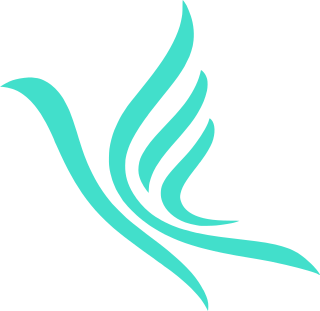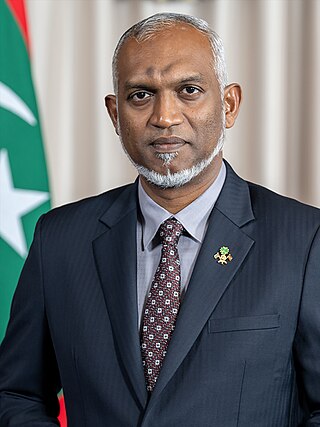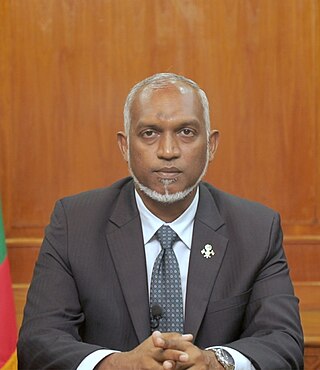Related Research Articles

The history of the Maldives is intertwined with the history of the broader Indian subcontinent and surrounding areas in South Asia and the Indian Ocean. The Maldives is formed of 26 natural atolls, comprising 1,194 islands.
The politics of the Maldives take place in the framework of a presidential representative democratic republic, whereby the President is the Head of Government. Executive power is exercised by the government. The President heads the executive branch and appoints the Cabinet; like many presidential democracies, each member of the cabinet need to be approved by the Parliament. The President, along with their pick for vice president, is directly elected by the denizens to a five-year term by a secret ballot. Once in office, they could be re-elected to a second 5-year term, which is the limit allowed by the Constitution. The current President of the Maldives is Mohamed Muizzu, when his predecessor, Ibrahim Mohamed Solih lost the 2023 Maldivian presidential election.

The Maldivian Democratic Party is the first political party formed in the Republic of Maldives with a total membership of 50,980 individuals as of July 28, 2024.
Definitions and restrictions on pornography vary across jurisdictions. The production, distribution, and possession of pornographic films, photographs, and similar material are activities that are legal in many but not all countries, providing that any specific people featured in the material have consented to being included and are above a certain age. Various other restrictions often apply as well. The minimum age requirement for performers is most typically 18 years.

The president of the Republic of Maldives is the head of state and head of government of the Republic of Maldives and the commander-in-chief of the Maldives National Defence Force.

Hulhumeedhoo or Hulhudhoo-Meedhoo is an island located on the northeastern end of Addu City. It is the fifth largest island in the Maldives. Although Hulhumeedhoo is geographically one island, it is divided into two administrative constituencies of Addu City; Meedhoo and Hulhudhoo, which are roughly the northern half and southern half of the island respectively. The name Hulhumeedhoo is an amalgamation of Hulhudhoo and Meedhoo.

Dr. Mohamed Munavvar was the former Attorney General of Maldives.
Legal frameworks around fictional pornography depicting minors vary depending on country and nature of the material involved. Laws against production, distribution, and consumption of child pornography generally separate images into three categories: real, pseudo, and virtual. Pseudo-photographic child pornography is produced by digitally manipulating non-sexual images of real minors to make pornographic material. Virtual child pornography depicts purely fictional characters. "Fictional pornography depicting minors," as covered in this article, includes these latter two categories, whose legalities vary by jurisdiction, and often differ with each other and with the legality of real child pornography.

The Progressive Party of Maldives, is a political party in the Maldives with a total membership of 35,044 as of 25 April 2024. The stated goal of the party is driving Maldives towards an independent and democratic, safe and secure, high income, high human capital, developed nation state with a diversified and robust economy whilst preserving its Islamic heritage. The party is to be dissolved.

Mohamed Arif, better known by his nickname Baka, was a Maldivian professional footballer who played as a midfielder for Myanmar National league club Kanbawza Football Club and the Maldives national team. Widely regarded as one of the greatest players in the Maldives, he was among the most successful players in the country.

Abdulla Yameen Abdul Gayoom is a Maldivian politician who served as president of the Maldives from 2013 to 2018.
Pornography in Asia includes pornography created in Asia, watched in Asia, or consumed or displayed in other parts of the world as one or more of the genres of Asian pornography.

Ibrahim Mohamed Solih, Frequently referred to as Ibu, is a Maldivian politician who served as the 7th President of the Maldives from 2018 to 2023. Solih was a parliamentarian for 15 years, he represented the Hinnavaru constituency and the Lhaviyani Atoll constituency during his tenure. He played a significant role in the democratic reforms of the Maldives and led the Maldivian Democratic Party (MDP) to victory in the 2018 presidential election. Solih was elected president on 23 September 2018 after winning the 2018 presidential election as the candidate for the Maldivian Democratic Party (MDP). His presidency focused on democratic governance, environmental sustainability, and strengthening international relations.

The People's National Congress, abbreviated as PNC, is a political party in the Maldives founded in January 2019 and the current governing party. The party's formation was spearheaded by former President Abdulla Yameen Abdul Gayoom, who had been in a dispute with the leadership of the Progressive Party of Maldives.

Presidential elections were held in the Maldives on Saturday, 9 September 2023, with a second round held on 30 September. Incumbent president Ibrahim Mohamed Solih was seeking re-election, after defeating the-then Speaker of the People's Majlis Mohamed Nasheed in the Maldivian Democratic Party primaries. People's National Congress candidate and Malé mayor Mohamed Muizzu won the election with 54% of the votes, defeating Ibrahim Mohamed Solih and becoming President-elect of the Maldives. It was the fourth consecutive election in which a Maldivian president failed to win reelection, the last to do so having been Maumoon Abdul Gayoom, who ran unopposed, in 2003.
The following lists events that happened during 2023 in the Maldives.

Mohamed Muizzu is a Maldivian politician and engineer who has been serving as the 8th president of the Maldives and leader of the Progressive Congress coalition since 2023. He previously served as housing minister from 2012 to 2018, making him the longest-serving housing minister in Maldivian history. Muizzu was the mayor of Malé from 2021 until his resignation in 2023.
Addu City Bridge, commonly known as Addu bridge or Addu City Bridge Project, Addu Connectivity Bridge Project is a planned bridge project, which will connect capital of Addu Atoll, Hithadhoo and Meedhoo in Addu city. The estimated length of the bridge is 13 to 15 kilometres cross the Addu atoll.
The following lists events that happened during 2024 in the Maldives.

Mohamed Muizzu's tenure as the 9th President of the Maldives began with his inauguration on 17 November 2023. Muizzu, a People's National Congress politician who previously served as Housing Minister for two terms under president Mohamed Waheed Hassan and Abdulla Yameen. Muizzu was the Mayor of Malé from 2021 until his resignation in 2023.
References
- ↑ "Prohibited Items". Maldives Customs Service. Retrieved 22 November 2024.
- ↑ "Nine students arrested in Addu City with pornographic material". Minivan News. 6 October 2014. Retrieved 22 November 2024.
- ↑ "Maldives Penal Code". University of Pennsylvania Law School . p. 92.
- ↑ "Nurse sentenced to six months in prison for producing, possession of pornographic materials". Sun. 4 December 2014. Retrieved 22 November 2024.
- ↑ "Maldives". Freedom House . Archived from the original on 25 September 2013. Retrieved 12 July 2017.
- ↑ "vnews - Maldives to block pornographic websites". Vnews.mv. Retrieved 2017-07-12.[ permanent dead link ]
- ↑ "PG orders Home Minister to block pornographic sites". Sun. 12 February 2015. Retrieved 22 November 2024.
- ↑ "ބަރަހަނާ ވެބްސައިޓްތައް އޮގަސްޓްގައި ބްކޮލް ކުރަނީ" [Porn websites being banned in August]. AdduLIVE (in Divehi). 26 May 2016. Retrieved 2017-07-12.
- ↑ "Top Sites in Maldives". Alexa. Archived from the original on 16 January 2018. Retrieved 19 November 2017.
- ↑ Rehan, Mohamed (17 December 2023). "President Muizzu pledges to block all explicit websites". The Edition . Retrieved 22 November 2024.
- ↑ "Maldives implements ban on pornographic websites". Avas. 16 December 2023. Retrieved 22 November 2024.